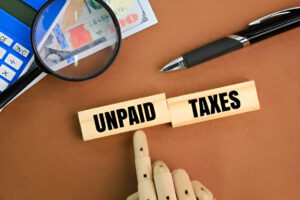Filing for Bankruptcy When You Have Unpaid Taxes in Texas: What You Need to Know

Wondering if You Can Discharge Tax Debt Through Bankruptcy in Texas?
If unpaid taxes are haunting your nights and IRS letters are piling up like junk mail, you’re not alone—and you’re not out of options. Many Texans face this dilemma and ask, “Can bankruptcy clear my tax debt?” or “What are my options if I owe the IRS and can’t pay?”
This blog is your in-depth guide to understanding how unpaid taxes interact with bankruptcy in Texas, what you can discharge, and how a trusted partner like Kisch Consumer Law can help craft a strategy that actually works for your situation.
Can You File for Bankruptcy If You Owe the IRS?
Yes—but with some conditions.
Not all tax debts are created equal. While many debts can be eliminated in bankruptcy, tax debt falls into a special category. Here’s a breakdown:
When Tax Debt May Be Discharged:
-
The tax is income-based (not payroll or fraud penalties).
-
The debt is at least three years old.
-
You filed a legitimate tax return at least two years ago.
-
The IRS assessed the debt at least 240 days ago.
-
There was no fraud or intentional evasion.
If these boxes are checked, you might qualify for IRS debt discharge under Chapter 7 or Chapter 13 bankruptcy.
But that’s just the beginning…
How Bankruptcy Works When You Owe Unpaid Taxes
Chapter 7 Bankruptcy: Total Discharge
If your IRS debt qualifies as dischargeable (based on the criteria above), Chapter 7 wipes it out completely—no repayment required.
However, non-dischargeable tax debts (recent filings, fraud penalties, or trust fund taxes) remain due even after your case is closed.
For detailed guidance straight from the source, review the IRS guidelines on bankruptcy and tax debt to understand how the agency treats different types of tax obligations in bankruptcy cases.
Chapter 13 Bankruptcy: Structured Repayment
This option creates a repayment plan over 3–5 years. You’ll still pay IRS debt, but:
-
Penalties may stop accruing.
-
You’ll avoid direct IRS collection actions like wage garnishments.
-
Dischargeable debts might still be wiped away after the plan.
What’s the Best Way to Handle IRS Debt in Texas?
Here’s where it gets tricky—because Texas laws, IRS rules, and your unique finances all collide.
The best way to handle IRS debt often involves a multi-pronged approach:
Texas Tax Relief Options:
-
Installment Agreements: Spread payments over time without bankruptcy.
-
Offer in Compromise (OIC): Settle with the IRS for less than you owe.
-
Currently Not Collectible (CNC): Prove you can’t pay now and delay collections.
-
Bankruptcy Filings: Discharge or restructure tax debt under the U.S. Bankruptcy Code.
To decide which path is best, a strategic legal partner—like Kisch Consumer Law—can help design a data-driven solution tailored to your debt, income, and legal standing.
What Happens to My Assets If I File for Bankruptcy in Texas?
Texas has some of the strongest bankruptcy exemptions in the country. You may keep:
-
Your home (via the Texas Homestead Exemption).
-
Your car (within equity limits).
-
Retirement accounts (IRAs, 401(k)s).
-
Personal property up to certain values.
Even if you owe the IRS, the state of Texas often protects your essentials from seizure. However, the IRS has its own power—so the sooner you act, the more control you maintain.
Why Choose Kisch Consumer Law?
If your search history includes “unpaid taxes bankruptcy Texas” or “how to stop IRS collections legally,” you’re likely ready for real help.
Here’s why Kisch Consumer Law is the go-to resource:
-
Experience in Texas Bankruptcy Law
-
Strategic IRS negotiation and settlement skills
-
Customized relief plans that align with your finances
-
Zero-pressure consultations
-
Transparent, flat-fee pricing
FAQs About Bankruptcy and Tax Debt in Texas
Can I stop IRS garnishments through bankruptcy?
Yes—filing bankruptcy enacts an automatic stay that halts IRS wage garnishments and levies immediately.
Will bankruptcy wipe out all my tax debt?
No—only qualifying tax debts (based on age and filing status) are dischargeable.
What if I didn’t file my taxes?
You’ll need to file overdue tax returns before your IRS debt can be considered for discharge.
Can I file bankruptcy more than once?
Yes, but there are waiting periods between filings and limits on what you can discharge.
Is it better to settle with the IRS or file bankruptcy?
It depends. Consulting with a debt-relief expert can help weigh your options objectively.
Quick Tips for Handling IRS Debt Strategically
-
Review IRS transcripts for key dates and assessment timelines.
-
Don’t ignore IRS notices—they’ll only get more aggressive.
-
Avoid tax scams promising unrealistic results.
-
Track statute expiration dates (many IRS debts expire after 10 years).
-
Partner with experienced bankruptcy counsel to maximize protection.
Need Help With IRS Debt in Texas? Let’s Talk.
Don’t wait until the IRS seizes your paycheck or your sleep. Whether you’re looking to discharge debt through bankruptcy or explore Texas tax relief options, the key is to act now—not later.
Visit Kisch Consumer Law to explore how you can build a data-driven legal strategy tailored to your financial situation.
Final Thoughts (With a Comical Twist)
Filing for bankruptcy with unpaid taxes might sound like walking into a lion’s den wearing BBQ sauce. But with the right legal guide, it’s more like walking into the DMV with an appointment—unexpectedly painless.
So if you’re stuck between a tax bill and a hard place, it’s time to bring in the pros. Kisch Consumer Law isn’t just a law firm—it’s your financial bodyguard in the Wild West of IRS collections.
And remember: The IRS doesn’t sleep. But neither do your legal options.
